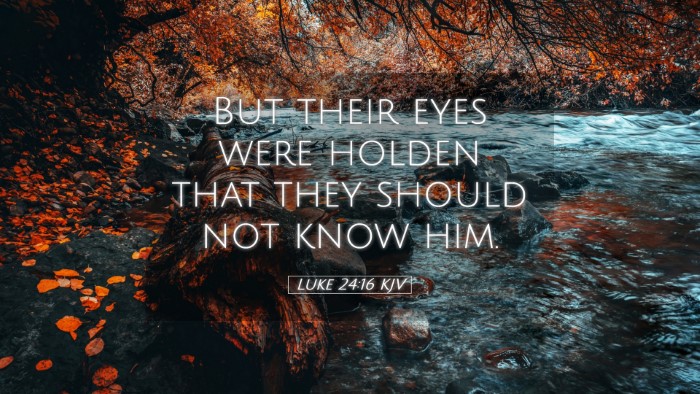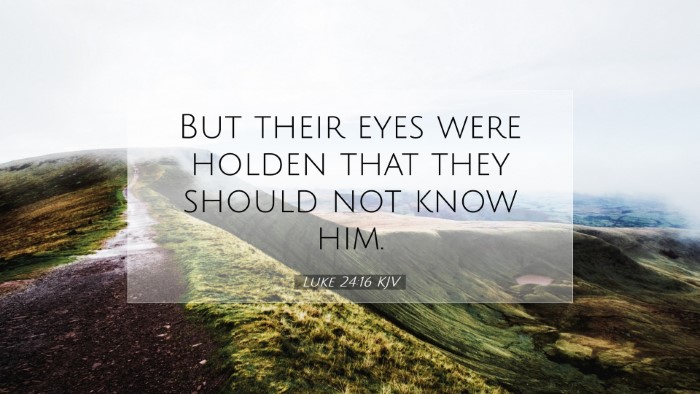Commentary on Luke 24:16
Verse Reference: Luke 24:16 - "But their eyes were holden that they should not know him."
Introduction
This profound verse comes in the context of the Resurrection appearances of Christ, specifically during His encounter with two disciples on the road to Emmaus. Various public domain commentaries provide rich insights into the theological and practical implications of this moment. It is important to note that the veil over their eyes serves as a critical theme in understanding the nature of revelation and recognition in the spiritual journey.
Contextual Background
-
Historical Setting: This passage is set on the day of resurrection. The disciples, filled with doubt and confusion, are trying to make sense of recent events—the crucifixion and the report of the empty tomb.
-
Importance of Recognition: The inability to recognize Jesus signifies more than mere physical blindness. It represents spiritual blindness, a common condition that affects many believers and non-believers alike.
Insights from Matthew Henry
Matthew Henry emphasizes the divine agency at play, noting that their eyes were "holden" or restrained by God. He points out that this serves as a reminder that understanding spiritual truths often requires divine revelation. Henry states:
“He that hath made the heart can open the eye; the opening and closing of the eyes are the work of the Almighty, and He does so at His sovereign pleasure.”
This highlights the necessity of spiritual enlightenment, which is governed by God's timing and will.
Insights from Albert Barnes
Albert Barnes takes a slightly different approach by focusing on the moral and practical implications of the disciples' unrecognition of Jesus. He observes:
“Their eyes were holden to bring them gradually into a clearer view of Christ’s true nature and mission, leading them from doubt to faith.”
Barnes suggests that this gradual illumination mirrors the journey of faith that all believers encounter. It serves as a reminder that faith is often a process, requiring patience and insight.
Insights from Adam Clarke
Adam Clarke discusses the nature of the disciples’ despair and confusion. He notes that their lack of recognition was a necessary part of their transformation:
“The veil drawn over their eyes was to engage them in a conversation with Christ, leading to an eventual understanding that would cement their faith.”
Clarke argues that this moment is essential for the disciples’ development, allowing them to come to a deeper revelation of who Jesus truly is as the Messiah.
Theological Implications
Luke 24:16 encapsulates significant theological concepts pertinent to the study of Christology and soteriology:
-
Revelation and Recognition: This verse illustrates the spiritual journey towards recognizing Christ. Theologians widely discuss how divine revelation is required for understanding spiritual truths.
-
Divine Sovereignty: The restraining of their eyes signifies God’s sovereign will in unearthing truth to individuals when He deems fit.
-
Process of Faith: The gradual realization of Christ's identity encourages believers to embrace a faith that is often iterative rather than instantaneous.
Practical Applications
For pastors, students, theologians, and Bible scholars, Luke 24:16 offers several practical applications:
-
Encouragement in Doubt: The experience of these disciples can encourage believers who struggle with doubt. The story illustrates that doubt does not preclude eventual faith.
-
Importance of Community: The journey taken by the disciples together highlights the value of fellowship and shared faith experiences.
-
Seeking Understanding: This passage encourages believers to seek deeper understanding through prayer and reflection, trusting that God will reveal His truths in His time.
Conclusion
Luke 24:16 serves as a potent reminder of the importance of divine revelation and the journey of faith. Drawing from the insights of significant biblical commentators like Matthew Henry, Albert Barnes, and Adam Clarke, we see that spiritual blindness is a common condition made clear by the divine hand. As we reflect on this verse, may we seek to trust in God’s timing and sovereign hand to open our eyes to the truth of Christ, much like those two disciples on the road to Emmaus.


